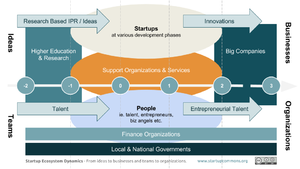|
Startup ecosystem
A startup ecosystem is formed by people in startups in their various stages, and various types of organizations in a location (physical or virtual) that are interacting as a system to create and scale new startup companies. These organizations can be further divided into categories such as universities, funding organizations, support organizations (like incubators, accelerators, co-working spaces etc.), research organizations, service provider organizations (like legal, financial services etc.) and large corporations. Local Governments and Government organizations such as Commerce / Industry / Economic Development departments also play an important role in a startup ecosystem. Different organizations typically focus on specific parts of the ecosystem function and startups at their specific development stage(s).[1][2][3] Emerging startup ecosystems are often evaluated using tangible metrics like new products, patents, and venture capital funding. However, Hannigan et al. (2022)[3] argue that understanding these ecosystems requires considering cultural factors alongside material ones. They emphasize that cultural elements, such as community engagement and shared values, play a crucial role in the growth and success of emerging startup ecosystems. By incorporating both cultural and material perspectives, policymakers can better design incentives and regulations to foster economic growth and innovation in these ecosystems. This approach suggests that building cultural infrastructure is as important as financial and technical support in developing thriving entrepreneurial environments. Silicon Valley, NYC, Singapore and Tel Aviv are considered examples of global startup ecosystems.  Composition of the startup ecosystem 
List of organizations and/or organized activities with startup activities
Investors from these roles are linked together through shared events, activities, locations, and interactions. Startup ecosystems generally encompass the network of interactions between people, organizations, and their environment. Any particular start-up ecosystem[9] is defined by its collection of specific cities or online communities. In addition, resources like skills, time, and money are also essential components of a start-up ecosystem. The resources that flow through ecosystems are obtained primarily from the meetings between people and organizations that are an active part of those startup ecosystems. These interactions help to create new potential startups and/or to strengthen the already existing ones. There are a few common mistakes that entrepreneurs make[10][11] that end up costing them their business, like inability to secure adequate funding, sudden market downturn and a poor scaling plan.[12] External and internal factorsStartup ecosystems are controlled by both external and internal factors. External factors, such as financial climate, big market disruptions, and significant transitions, control the overall structure of an ecosystem and the way things work within it. Start-up ecosystems are dynamic entities that progress from formation stages to periodic disturbances (like the financial bubbles) and then to recovering processes. Several researchers have created lists of essential internal attributes for startup ecosystems. Spigel[13] suggests that ecosystems require cultural attributes (a culture of entrepreneurship and histories of successful entrepreneurship), social attributes that are accessed through social ties (worker talent, investment capital, social networks, and entrepreneurial mentors) and material attributes grounded in a specific places (government policies, universities, support services, physical infrastructure, and open local markets). Stam[14] distinguishes between framework conditions of ecosystems (formal institutions, culture, physical infrastructure, and market demand) with systematic conditions of networks, leadership, finance, talent, knowledge, and support services. Startup ecosystems in similar environments but located in different parts of the world can end up doing things differently simply because they have a different entrepreneurial culture and resource pool. The introduction of non-native peoples' knowledge and skills can also cause substantial shifts in the ecosystem's functions. Internal factors act as feedback loops inside any particular startup ecosystem. They not only control ecosystem processes, but are also controlled by them. While some resource inputs are generally controlled by external processes like financial climate and market disruptions, the availability of resources within the ecosystem are controlled by every organization's ability to contribute towards the ecosystem. Although people exist and operate within ecosystems, their cumulative effects are large enough to influence external factors like financial climate. Role of employee diversityEmployee diversity also affects startup ecosystem functions, as do the processes of disturbance and succession. Startup ecosystems provide a variety of goods and services upon which other people and companies depend on. Thus, the principles of start-up ecosystem management suggest that rather than managing individual people or organizations, resources should be managed at the level of the startup ecosystem itself. Classifying start-up ecosystems into structurally similar units is an important step towards effective ecosystem managing. Startup ecosystem studiesThere are several independent studies made to evaluate start-up ecosystems to better understand and compare various start-up ecosystems and to offer valuable insights of the strengths and weaknesses of different start-up ecosystems. Startup ecosystems can be studied through a variety of approaches — theoretical studies, studies monitoring specific start-up ecosystems over long periods of time and those that look at differences between start-up ecosystems to elucidate how they work. Since 2012, San Francisco-based Startup Genome has been the first organization to release comprehensive research reports that benchmark startup ecosystems globally. Under the leadership of JF Gauthier and Marc Penzel, the company has been the first organization to capture the requirements of a startup ecosystem in a data-driven framework.[15] Startup Genome's work influenced startup policies globally and is supported by thought leaders such as Steve Blank[16] and has appeared in leading business media such as The Economist, Bloomberg and Harvard Business Review.[17] Global Startup ecosystem and rankingMultiple cities and hubs have been described as global Startup ecosystems. Startup Genome publishes a yearly ranking of global startup ecosystems.[18][19] The study does yearly reports ranking the top 40 global startup hubs.[19] In addition, StartupBlink, also releases an annual Index ranking global startup ecosystems, which evaluates over 1,000 cities worldwide.[20][21] Top Cities in Startup Genome GSER 2024
Further readingReferencesNotes
Further reading
|